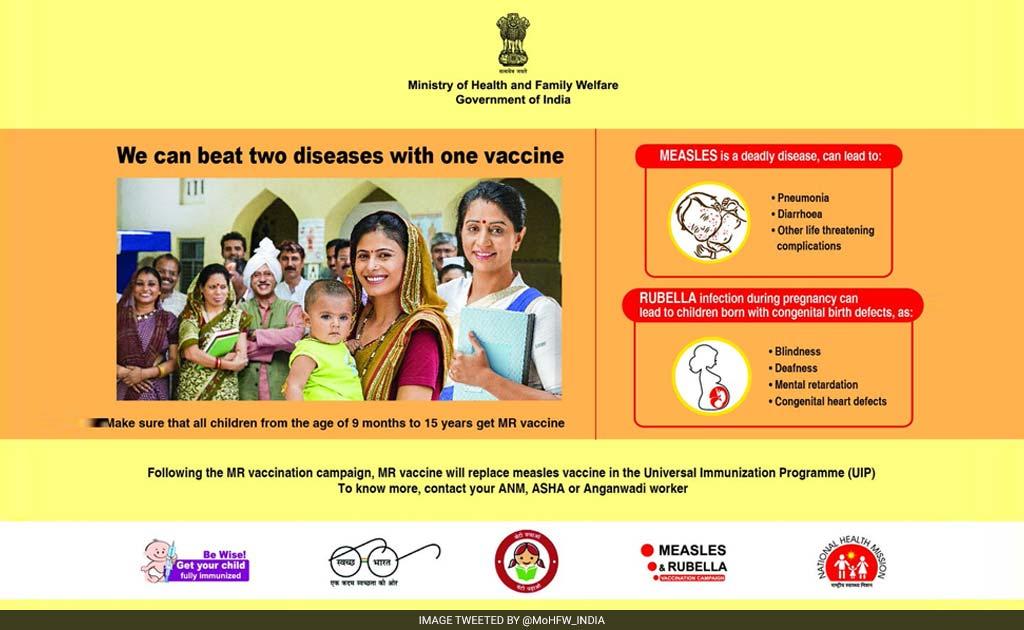Measles-Rubella (MR) vaccination campaign
Measles-Rubella (MR) vaccination campaign
India, along with ten other WHO South East Asia Region member countries, have resolved to eliminate measles and control rubella/congenital rubella syndrome (CRS) by 2020. In this direction, Ministry of Health & Family Welfare has initiated measles-rubella (MR) vaccination campaign in the age group of 9 months to less than 15 years in a phased manner across the nation. The campaign aims to cover approximately 41 crore children.
The Measles-Rubella campaign is a part of global efforts to reduce illness and deaths due to measles and rubella/CRS in the country. Measles immunization directly contributes to the reduction of under-five child mortality, and in combination with rubella vaccine, it will control rubella and prevent CRS.
Campaign implementation
The first phase of measles-rubella vaccination campaign has been successfully completed during February 2017 in five states, namely, Tamil Nadu, Karnataka, Goa, Lakshadweep and Puducherry. More than 3.3 crore children were vaccinated, reaching out to 97% of the intended age group. The campaign was carried out in schools, community centers and health facilities. The next round was taken up in 8 states/UTs (Andhra Pradesh, Chandigarh, Dadra & Nagar Haveli, Daman & Diu, Himachal Pradesh, Kerala, Telangana and Uttarakhand) during August 2017, aiming to cover 3.4 crore children. Since the launch in 2017, the MRV campaign has covered nearly 20 crore children in 30 states and Union Territories.
The campaign aims to rapidly build up immunity for both measles and rubella diseases in the community so as to knock out the disease, therefore, all the children should receive MR vaccine during the campaign.
In order to achieve maximum coverage during the campaign, multiple stakeholders have been involved, which includes, apart from Ministry of Health & Family Welfare, other Ministries, development partners, Lions clubs, professional bodies, for example, Indian Association of Pediatrics, Indian Medical Association, Civil Society Organizations etc.
Children to be covered
All children from 9 months to less than 15 years of age will be given a single shot of Measles-Rubella (MR) vaccination during the campaign. Following the campaign, MR vaccine will become a part of routine immunization and will replace measles vaccine, currently given at 9-12 months and 16-24 months of age of child.
For those children who have already received such vaccination, the campaign dose would provide additional boosting to them.
Source : Ministry of Health and Family Welfare
FAQs on MR vaccination
My child has already been vaccinated for measles and rubella as per immunization schedule given by the paediatrician / health centre. Why should my child take the vaccine during MR campaign again?
All children in the age group of nine months to 15 years must take the Measles and Rubella vaccine being given in the ongoing campaign. Even those children, who have been vaccinated for measles by their paediatrician or at health centres, should take the MR vaccine during the campaign.
The vaccine is safe. It has been seen that vaccinated children were also getting the disease, therefore, the additional dose during the campaign implies additional protection to the children. Measles is a major childhood killer disease and rubella leads to lifelong birth defects. Both diseases have no cure, but can be prevented by taking the MR vaccine. It is important for children to take the vaccine both in routine immunisation and in campaigns.
Every year in India nearly 2.7 million children get measles. Those who survive, suffer from serious complications including diarrhoea, pneumonia and malnutrition. Rubella transmission is also highly prevalent across India. Rubella infection during pregnancy may lead to spontaneous abortion, stillbirth and irreversible birth defects such as lifelong disabilities affecting multiple organs like deafness, blindness, mental retardation, heart defect etc. Every year over 40,000 children are born with such birth defects caused by Congenital Rubella Syndrome.
How safe is the MR vaccine, specially the one being used in MR campaign?
MR Vaccine is a safe and an effective vaccine, in use for over 40 years and in many countries across the world . The vaccine being given in the MR campaign is produced in India and is WHO prequalified. The same vaccine is being given in routine immunisation programme of India and in many neighbouring countries like Bangladesh, Sri Lanka, Nepal and Myanmar. Private practitioners in India have been giving Measles - Rubella ( MR ) or Measles - Mumps - Rubella ( MMR ) vaccine to the children for many years . Indian Academy of Paediatrics (IAP) endorses the strategy of MR vaccination.
Are there any side effects of the MR vaccine? School authorities are saying they are not responsible if anything happens to the child after taking MR vaccine during vaccination campaign in schools.
The MR vaccine which is being used in the campaign is completely safe. Like with any other injectable vaccine, there could be mild pain and redness at the injection site, low - grade fever, rash and muscle aches, which subsides on its own. The vaccine is not known to cause any other adverse event. However, all immunization sessions – whether in schools or outreach – are linked to fully equipped health centres to handle any adverse event.
Till what age MR vaccine can be given to children under Routine Immunization?
Two doses of MR vaccine should be given at 9-12 months and 16-24 months of age. However, if a child misses the scheduled dose, MR vaccine can be given till 5 years of age.
A 14 year old girl is having menses. Should the girl get the MR vaccine during campaign?
Yes, this girl should be immunized with the campaign MR vaccine. There is no harm in vaccinating girls who are having menses.
Who should NOT be vaccinated?
Do not vaccinate if the child has:
- High fever or other serious disease (eg: unconscious, convulsions, etc).
- Hospitalized children.
- History of a severe allergic reaction to measles/rubella vaccine in the past
Last Modified : 7/1/2021
